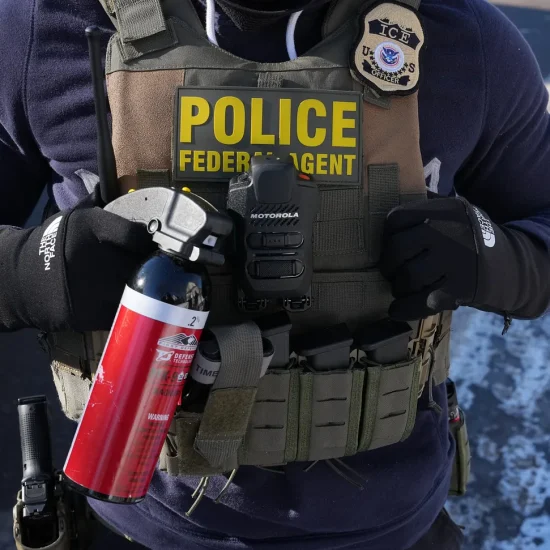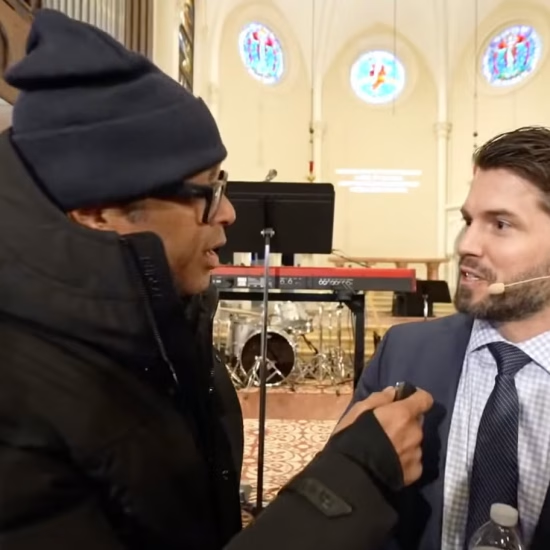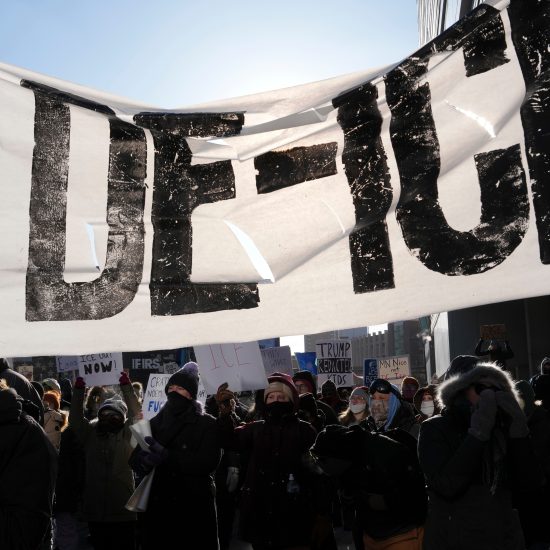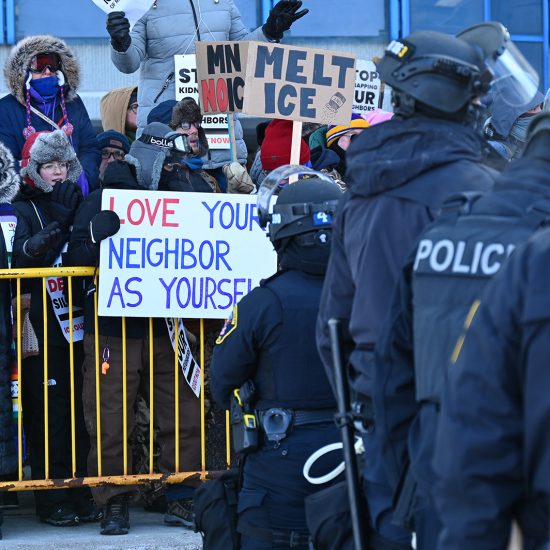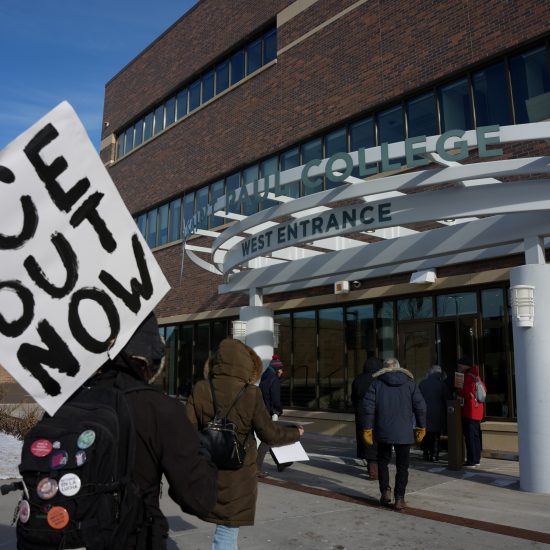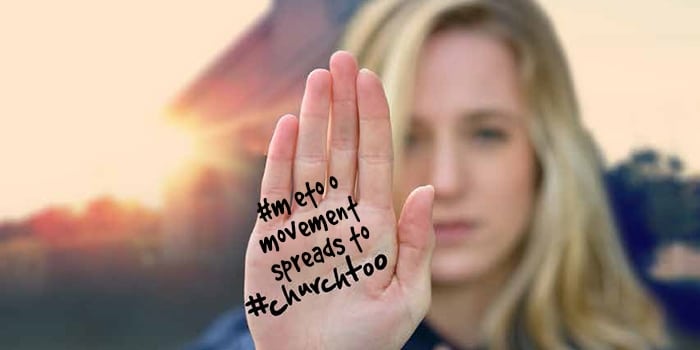
Soon after the first accusations of sexual assault and abuse by Hollywood producer Harvey Weinstein were made public, the #MeToo hashtag was born. It began with a simple idea tweeted by actress Alyssa Milano: “If all the women who have been sexually harassed or assaulted wrote ‘me too’ as a status, we might give people a sense of the magnitude of the problem.”
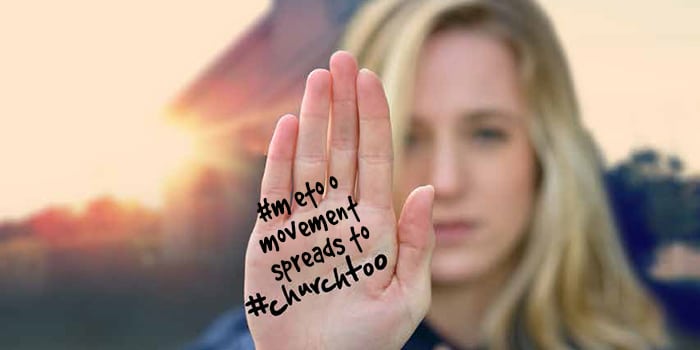 And, so, it did. Thousands of women shared their stories. Within a few weeks, another movement was launched — #ChurchToo — an effort to show that sexual abuse happens not just in the secular world but also all too often within the church. Pastors, ministers and seminary leaders joined the names of Hollywood figures and business leaders called out for abusing their power and authority over women in their churches, their youth groups and their ministries.
And, so, it did. Thousands of women shared their stories. Within a few weeks, another movement was launched — #ChurchToo — an effort to show that sexual abuse happens not just in the secular world but also all too often within the church. Pastors, ministers and seminary leaders joined the names of Hollywood figures and business leaders called out for abusing their power and authority over women in their churches, their youth groups and their ministries.
The list of names got longer and longer as women told their stories.
Andy Savage, teaching pastor at Highpoint Church in Memphis, Tenn. (a Baptist congregation), confessed to his congregation that as a young youth pastor he had initiated sexual contact with a girl in his youth group. His church gave him a standing ovation that day. Two months later, Savage resigned.
Frank Page, president of the Southern Baptist Convention’s Executive Committee, resigned in March over what he described as “a morally inappropriate relationship in the recent past.” Some Southern Baptist seminary professors also suddenly resigned in recent months, often with similarly cryptic references as to why. For instance, Christian George, curator of the Spurgeon Library at Midwestern Baptist Theological Seminary in Kansas City, Mo., resigned in May over what MBTS called “a personal moral failing.”
Bill Hybels, pastor of Chicago’s Willow Creek Community Church, denied charges of sexual harassment and misconduct brought by several women in his church. An investigation was initiated, but Hybels stepped down as senior pastor in April, a few months shy of his already planned October retirement. He also stepped away from the Global Leadership Summit, which he had planned to remain involved with after retirement.
And then came an April 30 column by author and religion writer Jonathan Merritt whose title asked a big question: “In a #MeToo moment, will Southern Baptists hold powerful men accountable?”
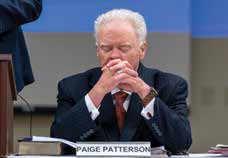 Paige Patterson during a May 22 Southwestern Baptist Theological Seminary trustee meeting. (Adam Covington/ Southwestern Baptist Theological Seminary)The powerful man Merritt, the son of a SBC president, focused on was Paige Patterson, president of Southwestern Baptist Theological Seminary and leader of the SBC’s shift to a more conservative stance on theological and political issues. Patterson’s comments on divorce and spousal abuse spurred more than 3,000 women to sign an online letter calling on Southwestern trustees to take action against Patterson, suggesting he was not fit to lead.
Paige Patterson during a May 22 Southwestern Baptist Theological Seminary trustee meeting. (Adam Covington/ Southwestern Baptist Theological Seminary)The powerful man Merritt, the son of a SBC president, focused on was Paige Patterson, president of Southwestern Baptist Theological Seminary and leader of the SBC’s shift to a more conservative stance on theological and political issues. Patterson’s comments on divorce and spousal abuse spurred more than 3,000 women to sign an online letter calling on Southwestern trustees to take action against Patterson, suggesting he was not fit to lead.
“The Southern Baptist Convention cannot allow the biblical view of leadership to be misused in such a way that a leader with an unbiblical view of authority, womanhood and sexuality be allowed to continue in leadership,” the online letter says.
But it was not Patterson’s comments 18 years ago that led to his complete dismissal from the seminary. Instead it was an incident that happened in 2003 while Patterson was president of Southeastern Baptist Theological Seminary. It was there that one of the students at the seminary, Megan Lively, was raped. It was there that she was advised by Patterson not to go to the police. And it was there that she was shamed for allowing herself to be a victim.
“They shamed the crap out of me, asking me question after question,” Megan Lively told the Washington Post, talking about Patterson and other men she met with following her report of the incident to school administrators. “He didn’t necessarily say it was my fault, but [the sense from him was] I let him into my home.”
Lively identified herself publicly on Twitter on May 28, writing, “I am the woman you read about, #SEBTS 2003, not afraid, ashamed or fearful. I am proud to be #SBC, bc of how many have responded with compassion & love. Our history isn’t our future.”
Two days later Patterson was out — Southwestern severed ties completely. In a statement, the trustees said SWBTS “denounces all abusive behavior, any behavior that enables abuse, any failure to protect the abused and any failure to safeguard those who are vulnerable to abuse.”
Another statement on June 1 by Kevin Ueckert, chairman of SWBTS’s Board, added reasons for the firing to include misleading board members during an earlier meeting, removing documents from SEBTS and comments in a 2015 email about a female SWBTS student who reported she had been raped in which Patterson said he wanted to “break her down.”
“The attitude expressed by Dr. Patterson in that email is antithetical to the core values of our faith and to SWBTS,” Ueckert wrote. “Moreover, the correlation between what has been reported and also revealed in the student record regarding the 2003 allegation at Southeastern and the contents of this email are undeniable.”
Southern Baptist notables took to Twitter to praise Lively’s bravery.
“Megan you are mighty,” tweeted Beth Moore, founder of Living Proof Ministries. “Thank you not only for your bravery but your BELIEF in who Christ is, in what he does, in how he’s called you, raised & equipped you. For other victims to see fellow women come out on the other side strong, with heads held high & their souls intact is HUGE.”
“Thankful for you and your strength,” tweeted Ed Stetzer, executive director of the Billy Graham Center at Wheaton College.
The events surrounding Patterson’s ouster show just how institutionalized the effort to silence victims of sexual abuse and assault has been. In a May article published at Christianity Today, Albert Mohler Jr., president of the Southern Baptist Theological Seminary in Louisville, Ky., blamed an “unorganized conspiracy of silence” for the “avalanche” of allegations that have come to light in recent months.
The conspiracy of silence Mohler noted was no secret, however. Baptist outlets like Baptist News Global and EthicsDaily.com reported years ago on Patterson covering up sexual abuse among clergy. And Patterson is hardly the first Baptist leader caught up in acts that would be more publicized if they occurred now in the light of the #MeToo movement. The Missouri Baptist Convention fired David Clippard as executive director in 2007 for, among other reasons, his mishandling of a lawsuit that accused him of sexual harassment. His successor, David Tolliver, resigned in 2011 after “immoral behavior with a woman.” Additionally, numerous Baptist pastors across the region and nation have been caught committing a variety of sexual offenses.
The #SilenceIsNotSpiritual movement also knew about the broader conspiracy of silence in churches, which is why the effort that took off in early 2018 focused on combating such silence on issues of sexual harassment and abuse. The movement called on leaders to take action and stand up for women and girls.
“We face a defining moment as a Church,” the movement’s mission statement declares. “Will we shrink in fear and despair or will we join the cry of the vulnerable, echoing their voice and defending their courage?”
 Pam DursoPam Durso, executive director of Baptist Women in Ministry, says the outrage in the religious community following the #MeToo movement points to the success of the movement. She is concerned that the response has failed to address what is at the heart of the problem — blatant sexism.
Pam DursoPam Durso, executive director of Baptist Women in Ministry, says the outrage in the religious community following the #MeToo movement points to the success of the movement. She is concerned that the response has failed to address what is at the heart of the problem — blatant sexism.
“Many Southern Baptist leaders, both back in the 1970s and now, devalue women. They believe women are simply a means to an end — for the salvation and satisfaction of men,” Durso wrote in a May blog post.
Baptist Women in Ministry formed a Clergy Sexual Misconduct Task Force in 2016 to help churches by providing resources, including a Covenant for Clergy Sexual Ethics. The covenant calls on ministers to commit themselves to ethical sexual conduct in all ministry activities, to recognize their power and authority as ministers of the Gospel, to establish healthy boundaries and relationships to prevent misconduct and to report any instances that come to their attention to the proper authorities.
In an interview with Religion News Service, Julie Roys, a conservative Christian radio show host, said the Church is not immune from efforts to cover up sin but Christian leaders should resist that urge.
“Unconfessed sin will only spread and fester and cause more destruction,” Roys said. “Plus, burying sin is antithetical to the Gospel. Scripture says if we confess our sin, we will be forgiven and cleansed; if we don’t, we stand condemned.”
Carrie Brown McWhorter writes for several publications, including The Alabama Baptist newspaper and Missions Mosaic magazine. Find her on Facebook @McWhorterMedia or visit her website, carriebrownmcwhorter.com.

